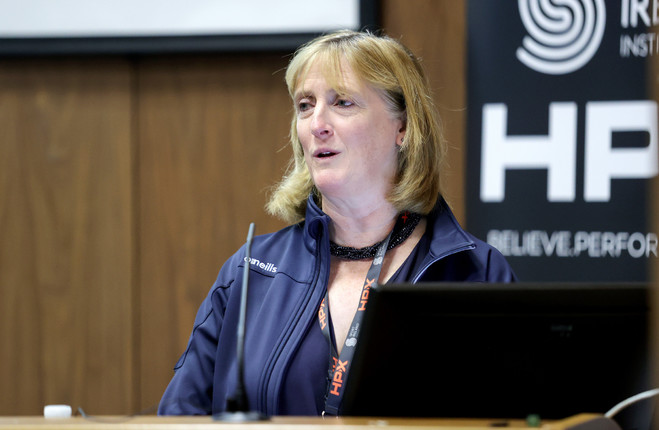SPORT IRELAND SAY they have no jurisdiction to introduce anti-doping tests to schools’ rugby, and that it is up to the schools themselves to allow any such testing policy to be introduced.
In 2011, the IRFU and Sport Ireland (then known as the Irish Sports Council) said that a framework agreement had been struck to introduce testing for performance enhancing drugs to schools rugby competitions, and would be delivered in the “very near future.”
Thirteen years on, that testing regime has never been introduced, a fact raised last week by the Sunday Independent.
“The most important thing to acknowledge that Sport Ireland doesn’t have jurisdiction over schools rugby, they are not members of the IRFU in the same way as any of the clubs are”, Sport Ireland CEO Dr. Una May told The 42 at a press conference following today’s announcement of a record State investment in high performance sport.
“We don’t have that natural jurisdiction, so it would require an arrangement to come between the schools rugby association and ourselves. We have always been willing to support that if a request came, in the same way we support many other sports who are willing to come to us to seek those additional tests.”
Dr. May served as Sport Ireland’s head of anti-doping prior to her appointment as CEO, and in 2011 she said the proposed testing regime would act as a deterrent. “When we test at younger levels it’s about protecting the individuals”, she said at the time. “We’ve no desire to catch people out. We want it to be a deterrent. Rugby is a high-risk sport and it’s high risk for the athletes in terms of the temptation to take something in order to get themselves on to the top level.”
In 2017, a Sport Ireland spokesperson told the Irish Times that “based on evidence in other countries, schools rugby could be a potential risk area”, adding “the testing of schools rugby remains on the agenda with the IRFU.”
Asked today whether she still believed doping in schools remained a potential risk area, Dr. May said, “We have yet to see any evidence. We have never received any concrete submissions to our ‘report doping’ hotline that would suggest there’s a definite issue there.”
When it was put to her how the absence of doping can be ascertained without a testing regime, she replied, “We have an intelligence-led approach to our anti-doping programme. We have a retired Garda investigator working with us, who helps us interrogate information when we receive information.
“But we don’t receive information, and in Ireland it has been recognised over the years that it’s very difficult to be involved in doping in Ireland without it becoming obvious to somebody, if not somebody close to you, somebody in your community who would, we hope [report it.]
“We have tried to instill that philosophy that it’s important people would report it if they see it, as we can’t be out there testing every athlete in every single sport.”
Dr. May said there are risks associated with the introduction of a drug testing regime at schools level with which Sport Ireland are not comfortable engaging.
“Targeting underage athletes is not really our overall policy, there are significant implications around doping in sport, and to target someone who is at a very young age and put them at risk of a system which is designed around adults, who are of a mindset who can make those those kinds of decisions themselves. The world anti-doping code recognises that younger athletes are in a situation where they may be coming under pressure from outside forces which puts them at a higher risk of inadvertent doping from the point of view of the individual. That is not a risk we feel is appropriate and we are not comfortable to enforce that kind of risk.
“We have a ‘report doping hotline’ and we have had no concrete evidence of anything, and we haven’t had any anecdotal evidence of this within our own system. We do recognise that there is talk about the issues that might be out there. The challenges are also around the risks associated with what we define as ‘recreational doping,’ which is the taking of recreational substances which are not intended for performance enhancement in sport, and we are not in the business of managing that issue that exists, I think, across society in Ireland these days.”
Rugby players are tested at under-18 interprovincial level, which Dr. May says is a different issue to conducting tests at school level. All of these tests are subject to parental consent.
“We do test the underage athletes when they are in the system”, said Dr. May. “When they are in a system they are in a care system which provides the education and the support and the guidance they require.”
Asked whether the safety of testing as a doping deterrence outweighs the risks inherent in any testing regime, Dr. May said, “Our sense is it’s not the only way to stop it happening, and it comes at a very, very high price tag to test people as a deterrent. It needs to be part of an overall structured system, to provide that level of deterrence. Testing people into fearing the system is not our philosophy, our intention is that people would have the education and values-based system of approaching sport that would be consistent with our overall approach to high levels of integrity across all of Irish sport.”
Asked for his opinion on the subject, minister of state for sportThomas Byrne said, “Una is one of the national experts on anti-doping, so I take what Una says very, very seriously. It is very reasonable for Sport Ireland and anti-doping policy in general, on which I’m not an expert, to have a different approach for minors. To me, as a non-expert in the area, that sounds absolutely reasonable.
“What Una has said, there is a different approach and I support that. Here in Sport Ireland we have significant expertise with Una and others in the whole area of anti-doping, I would certainly listen very carefully to what Una says on that. She knows as much if not more than anyone in the country on this particular issue.”


